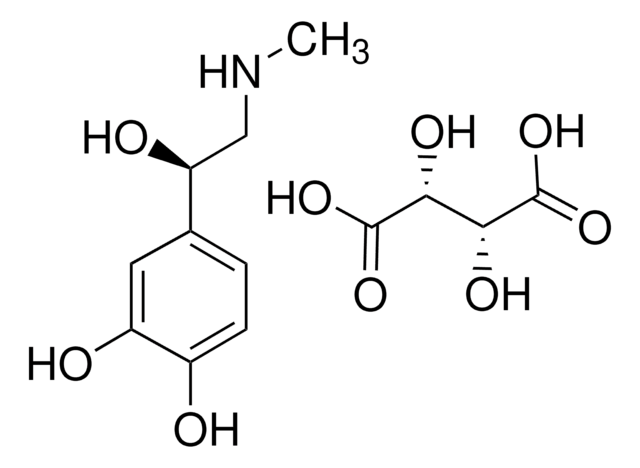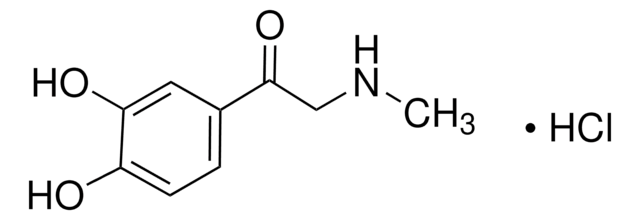E4642
(±)-Epinephrine hydrochloride
≥98% (TLC), powder, adrenergic receptor agonist
Synonym(s):
(±)-Adrenalin, 4-(1-Hydroxy-2-[methylamino]ethyl)-1,2-benzenediol hydrochloride
About This Item
Recommended Products
product name
(±)-Epinephrine hydrochloride,
Quality Level
solubility
H2O: 50 mg/mL
storage temp.
2-8°C
SMILES string
OC(CNC)C1=CC=C(O)C(O)=C1.Cl
InChI
1S/C9H13NO3.ClH/c1-10-5-9(13)6-2-3-7(11)8(12)4-6;/h2-4,9-13H,5H2,1H3;1H
InChI key
ATADHKWKHYVBTJ-UHFFFAOYSA-N
Gene Information
human ... ADRA1A(148) , ADRA1B(147) , ADRA1D(146) , ADRA2A(150) , ADRA2B(151) , ADRA2C(152) , ADRB1(153) , ADRB2(154) , ADRB3(155)
Looking for similar products? Visit Product Comparison Guide
General description
Application
- in the induction of renalase expression in Human renal proximal tubular epithelial cells
- in the infusion studies to test its effect on heart rate and eye temperature measurements in bull
- as a medium supplement for the stimulation of endothelial progenitor cells
Biochem/physiol Actions
Other Notes
Signal Word
Danger
Hazard Statements
Precautionary Statements
Hazard Classifications
Acute Tox. 3 Dermal - Acute Tox. 3 Oral - Eye Irrit. 2 - Skin Irrit. 2 - STOT SE 3
Target Organs
Respiratory system
Storage Class Code
6.1A - Combustible acute toxic Cat. 1 and 2 / very toxic hazardous materials
WGK
WGK 3
Flash Point(F)
Not applicable
Flash Point(C)
Not applicable
Personal Protective Equipment
Regulatory Listings
Regulatory Listings are mainly provided for chemical products. Only limited information can be provided here for non-chemical products. No entry means none of the components are listed. It is the user’s obligation to ensure the safe and legal use of the product.
JAN Code
E4642-VAR:
E4642-5G:
E4642-100G:
E4642-VAR-9:
E4642-BULK:
E4642-BULK-9:
E4642-5G-9:
E4642-25G:
Certificates of Analysis (COA)
Search for Certificates of Analysis (COA) by entering the products Lot/Batch Number. Lot and Batch Numbers can be found on a product’s label following the words ‘Lot’ or ‘Batch’.
Already Own This Product?
Find documentation for the products that you have recently purchased in the Document Library.
Customers Also Viewed
Our team of scientists has experience in all areas of research including Life Science, Material Science, Chemical Synthesis, Chromatography, Analytical and many others.
Contact Technical Service











